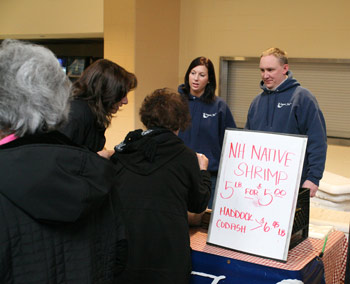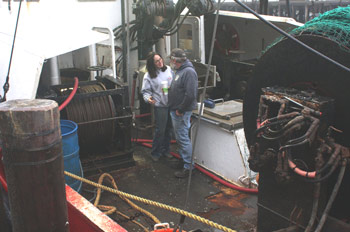Fishermen on Fishing.....

Neal Pettigrew, Seaport Market, right, “I started in the Seafood business when my grandfather and uncle were in the business. Now we unload vessels year round from Portsmouth and Rye.It is great to have our pick from the top of the catch.” ©Photo by Sam Murfitt
I have a crew of guys that unload the local boats at the Portsmouth Commerial Fish Pier (formally the Portsmouth Fisherman’s Co-op), and at Rye Harbor.
From there, we cull out the catch, keep what we need for the local markets, and ship the rest to Boston or Portland. Sometimes it goes to auction, other times it is sold directly to wholesalers, whichever will bring the most money back to the boat.
We have had great success selling and marketing the local catch. The restaurants we sell to can tell their customers the name of the vessel, and the crew. We can even tell them what grounds they were fishing. Our retail customers also love this information. Our retail tags name the vessel the local catch came from.
Anytime we can unload a local vessel, with local employees, and sell the fish at our local retail store or a local restaurant, it is nice to know that the money is staying local, and we are supporting our local industry.
Quality fresh seafood at a great price while returning the most money possible back to the boat.
I started in the seafood business at a young age, when my grandfather and uncle were in the business. Years later I bought the business from my aunt and uncle. After the Portsmouth Fisherman’s Cooperative was no longer in business I had an opportunity to unload the vessels and lease some facilities at the Portsmouth Commercial Fish Pier. Now we unload vessels year round from Portsmouth and Rye.
It is great to have our pick and the top of the catch. We could not get a nicer, fresher product to distribute to our local customers.
With the farmers markets we do, people are starting to catch on to the “not so popular” species like pollack and others. Meanwhile, they are some of the most sustainable fisheries. Customers really enjoy buying local seafood and knowing they are supporting local fisherman.
We hand cut and process all of our fish. Our fish gets distributed seven days a week to all of our wholesale/restaurant accounts, and our retail stores in Portsmouth and Dover. As a member of the Seacoast Growers Association, we attend farmers markets year round. We sell fresh seafood from around the world, but there is nothing like distributing fresh local seafood to a chef you know, who is going to sell it to a customer you might know, and it came off a fishing vessel with a crew you know. Keeping it local.
I believe catch shares is going to be detrimental to the industry, and especially locally where a large number of our local vessels did not get enough quota to make it worth their while to fish. The government is getting just what they wanted, putting the fishermen out of business.
It will be sad if we have to rely on Canadian and Pacific fisheries to sustain our markets, while the local fishing community gets put out of business.

Allyson Jordan, Portland.“It used to be tallymen were the owner’s dockside monitor. You need to have all the weight that you bring in so you get paid for it and any smart owner would have had a tallyman to know that there wasn’t fish disappearing.” ©Photo by Sam Murfitt
Why do we need all this monitoring when if we don’t weigh out good weight, we don’t get paid for it and we don’t get the history so why would we want to lie about what we were landing? That’s the bottom line. Sectors is going to go into effect, but the general pool is so miserable at this point, what is the point? I would keep one boat in the general pool with all my days and put the other one under sectors. At this point, we can’t even afford to do that, you can’t tie up a boat. I am definitely going to lose a boat.
We have to spend money and the question is why do these environmental organizations, not our government, get the money to help us form sectors when we should have gone to ITQs directly and it should have been voted on. We worked for our history, we stayed in our business for our history, we played by the rules, and now we are being scrutinized again. It’s like the dockside monitoring issue. Now we are not only going to have dockside monitoring. We have environmental police, and National Marine Fisheries Service police.
It used to be tallymen were the owners dockside monitors…you need to have all the weight that you bring in so you get paid for it and any smart owner would have had a tallyman to know that there wasn’t fish disappearing. You look at the Portland Fish Exchange, that is all they (dockside workers) know and now we are going to give it to some person who is from a nongovernmental, environmental organization that has nothing to do with fishing and their families. They are taking local business away. Sectors are not helping the local economy.
